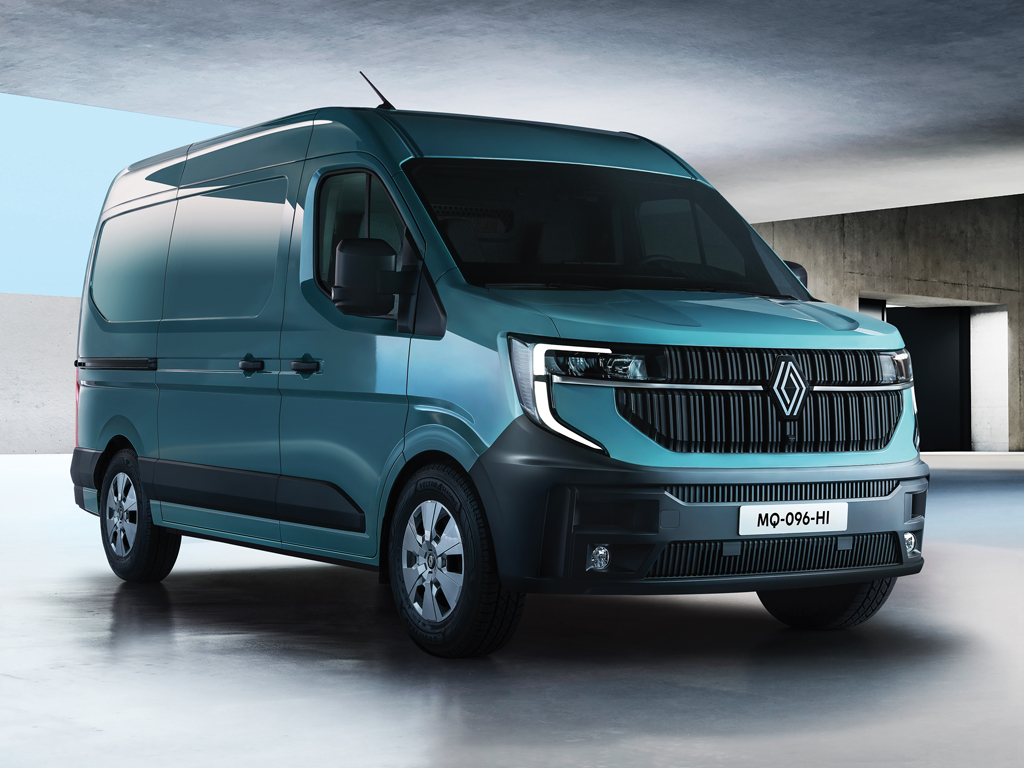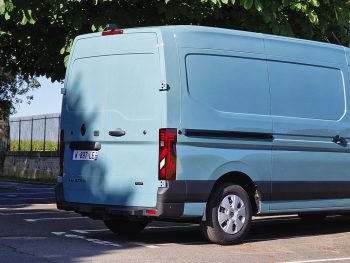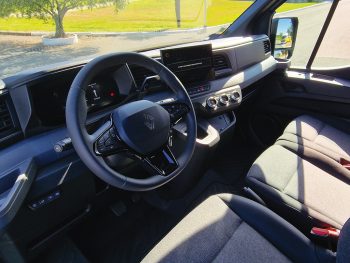It’s been quite some time since we’ve had a revision of the Master E-Tech, but Renault has recently dropped a bombshell into the increasingly competitive electric large van market with the new model.

The previous generation had a 52kWh battery and a claimed range of 124 miles, although this was said to be closer to 87 miles in the real world. It also shared the Kangoo E-Tech’s underwhelming 77hp/85kW electric motor. These figures meant that rivals such as the Ford Transit, Maxus eDeliver 9 and Mercedes eSprinter effortlessly sailed ahead. However, things have now drastically changed for the new Master.
To keep up with the competition, Renault has given the Master E-Tech fresh new bodywork, a more powerful drivetrain and an updated interior. While there are two battery options available, UK buyers will only receive the 285-mile 87kWh battery, but European markets will have the choice of a smaller 40kWh option, the same battery offered with its sibling, the Nissan Interstar.
Likewise, power output from the electric motor has been upped to a modest 140hp, making it far from the most powerful option offered in an electric van. When booting the throttle, there’s no sense of urgency but instead, it feels linear and composed, even with the 400kg payload that our test van had.
Setting off with 98% charge, we tested the E-Tech over a 52-mile (84km) route consisting of motorways, backroads and town driving, and returned with 77% left. On the road, there was very little road noise, and the E-Tech’s sharp turning circle assisted when we got a bit lost in the tight Bordeaux backroads. Despite its power figures, the E-Tech is great to drive, despite it being more sedate than its diesel counterparts, and never really struggled up various inclines or from a standstill.
You sit high up in the driver seat and road visibility is excellent through the large windscreen, and Renault has introduced a very welcome piece of tech: a digital rear-view mirror. Using a rear-view camera, the image is clearly displayed on the rear-view mirror, which is ideal for reversing this much real estate. Through town, the short nose and large side windows make you quickly forget about its girth and soon fill you with confidence when it comes to parking head-on.
Inside, there’s plenty of passenger space, although the middle occupant may be kneeing the intrusive dashboard if they’re tall. There’s also overhead storage and a massive under-seat cubby, somewhere that we thought would be ideal to stow the charging cable. Luckily, Renault hasn’t ditched all the interior buttons in favour of a fiddly touchscreen. The steering wheel is graced with cruise control and radio switches. To the left of the steering wheel are another four switches and positioned below the touchscreen are good ol’ fashioned heater control knobs and various other buttons. Likewise, there’s no electronic handbrake but instead an old-school lever.

Oddly, there’s no grab handle on the A-pillar, which can make getting into the E- Tech an interesting experience. If you do encounter any entry issues, simply grab the cup holder, which can take 300kg, and pull yourself up into the cabin.
Like the diesel guises, there are three body sizes. The entry-level MM van has a 10.8m³ load area with a height of 2,502mm and a length of 3,585mm. Spent a bit more, and you can have the next-in-line LM, which has a 13m3 load area and a longer 4,213mm wheelbase. Next, is the LH, the largest variant, which offers a 14.8m³ load space and an increased height of 2,780mm. The old van’s payload was capped at 1.2 tonnes, but the new E-Tech can carry up to 1,625kg. The 3.5-tonne MM will carry 1,125kg while the LM will manage 1,047kg in its 3.5-tonne form or 1,547kg in its 4.0-tonne form.

When it comes to charging, the 22kW three-phase system will replenish the battery from empty to full in four hours 35 minutes. Find a meaty enough charger and it should charge in just one hour 10 minutes. Prices start at £42,500 although the £5,000 government Plug-in Van Grant takes this down to £37,500.
IN BRIEF
WHAT IS IT? Large van
HOW MUCH? £42,500 (incl. VAT) GROSS PAYLOAD? 1,625kg (max) RANGE? 285 miles
BATTERY? 87kWh
CHARGING? 130kW DC / 22kW AC

